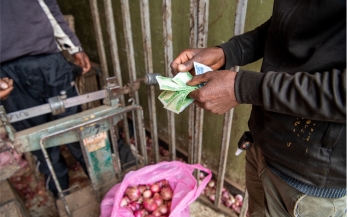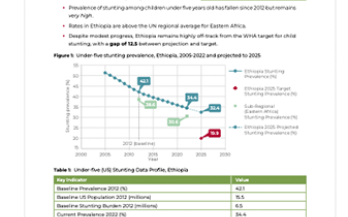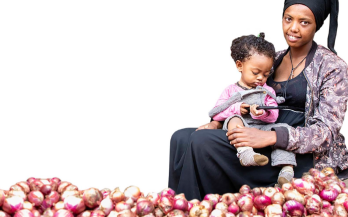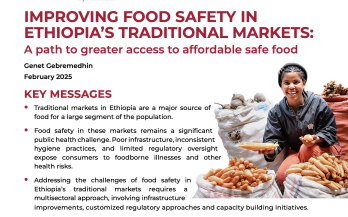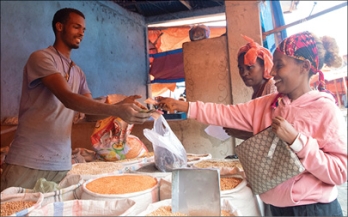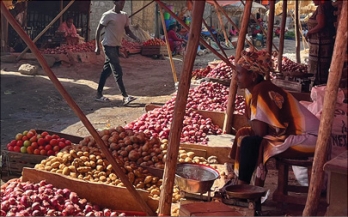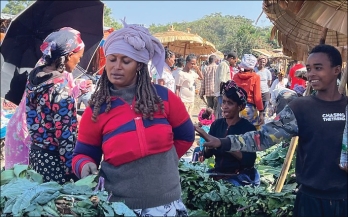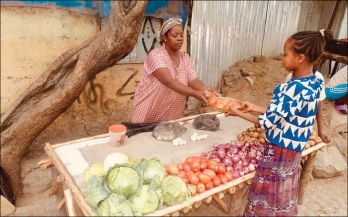- 11/10/2025
KEY MESSAGES
Children in both urban and rural Ethiopia are increasingly consuming ultra-processed foods that contain unhealthy levels of sugar, salt, and unhealthy fats. These items, heavily marketed and widely accessible, are rapidly replacing traditional healthy diets.
Inadequate and unhealthy diets during childhood can compromise physical and cognitive development, diminish immune function, and increase susceptibility to chronic illnesses later in life.
Priority policy areas the government should consider include: more nutrition education; improved regulation of the food environment to make healthy options more prominent and unhealthy options less prominent; subsidies that prioritize healthy diets for children; and improved coordination and coherence across sectors seeking to transform food systems (e.g. Agriculture, Education, Health, and Trade).
Reducing unhealthy diets in children is not just a nutrition issue – it’s a systems issue. Ethiopia must urgently implement a coordinated, multi-sectoral strategy with actions to ensure all children have access to diverse, healthy, safe, and affordable diets from the start of life.
- 02/09/2025
In 2022, rapid food price increases raised interest in how such shocks impact markets and consumers—and how policy can mitigate them. To examine this, we undertook a detailed qualitative study in urban Ethiopia, a country particularly hard hit by food inflation. Over two periods in summer 2022, in-depth interviews were undertaken with 83 consumers and market vendors in Hawassa, a mid-sized city, including structured free-listing and ranking exercises.
- 16/05/2025
WHA Global Nutrition Stunting Target 2012-2025
Achieve a 40% reduction in the number of children under-5 who are stunted
WHA Global Nutrition Overweight Target 2012-2025
Ensure that there is no increase in childhood overweigh
- 22/04/2025
These fact sheets look at the roles that can be played by different stakeholders seeking to improve food systems and nutrition in Ethiopia.
• Stakeholders from diverse groups have a role to play in transforming Ethiopia’s food system to address complex challenges arising across the supply chain that contribute to food insecurity and malnutrition.
• Each stakeholder group must take steps towards enhancing collaboration, aligning efforts, and working to deliver a more sustainable and resilient food system for the country.
• Key recommendations include strengthening government commitment, mobilising financial and technical resources, building capacity across different groups, setting up accountability mechanisms, boosting inclusivity of decision-making processes, leveraging technology and innovation, and conducting periodic assessments to identify emerging challenges and opportunities.
- 07/08/2023
As part of EatSafe's effort to evaluate the impacts of food safety behavior change interventions, this report summarized food safety behaviors and behavior drivers across four food safety macro-indices, assessed via structured surveys of vendors and consumers in Hawassa, Ethiopia.
- 02/10/2023
EatSafe collected samples of three nutritious commodities to assess the relative exposure and risk of foodborne illness from consuming tomatoes, kale, and lettuce sold in traditional food markets in Southern Ethiopia.
- 06/09/2022
To increase consumer demand for improved food safety, EatSafe is testing three interventions that seek to change consumers and vendor behaviors in a traditional food market in Hawassa, Ethiopia.
- 20/02/2023
The EatSafe program conducted a range of formative research activities to understand the local context in Hawassa, Ethiopia. Learnings from these activities were then used to develop market-based interventions to increase consumer demand for improved food safety.
- 11/01/2023
As elaborated in a GAIN evidence brief, poor-quality diets and insufficient food quantity are linked to reduced work capacity. This suggests that the malnutrition burden can be partly addressed through a win-win-win approach which improves individual lives, business outcomes, and national economies.

